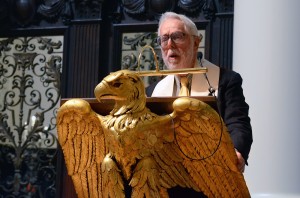
Stand for Democracy, an Harvard University-based group dedicated to maintaining the public’s right to vote, sponsored the “Yes For Justice Interfaith Prayer Rally: Towards a New Dawn” at The Memorial Church of Harvard Wednesday night to garner support for Question 3 and Question 4 on the Massachusetts ballot in the November general election.
A “yes” for Question 3 on Nov. 4 would repeal a 2011 law allowing resort casinos in the Commonwealth, and a “yes” for Question 4 would entitle certain employees to earn and utilize paid sick days.
The prayer rally consisted of Christian, Islamic and Jewish prayers interspersed among religious leaders’ brief speeches about the issues of Questions 3 and 4. After the rally concluded, attendees had the opportunity to talk one-on-one with each speaker.
“Casinos siphon off money from the economy, so there’s only casino owners and investors, most of whom do not live within our communities, who can themselves profit,” said Rev. Luther Zeigler, president of the Harvard Chaplains, an organization dedicated to serving the Harvard community. “The evidence shows that casino gambling generally seeks income disproportionately from lower-income classes.”
The ultimate impact, Zeigler said, is the gradual redistribution of wealth, which over time contributes to an increased disparity between the rich and the poor.
Lewis Finfer, the executive director of the Massachusetts Communities Action Network, said without a government mandate, 30 percent of Massachusetts’ residents lack sick days at work.
“Almost 1 million people in Massachusetts do not have sick days, so they cannot take care of themselves if they’re sick, take care of their children, or take care of their relatives,” he said. “And Question 4, if people vote yes on that, will give people five sick days a year to take care of themselves and their family.”
Rev. Dr. Roberto Miranda, of the Congregation León de Judá in Boston, said he witnessed the lack of sick days target mainly lower-income classes, similar to the casino issue of Question 3.
“As the pastor of a mainly Latino congregation, I observe daily the plight of undocumented workers, single mothers and skilled laborers, who sometimes hold two, and even three jobs in order to make ends meet,” he said.
These workers represent some of the most valuable, yet powerless groups in the community, Miranda said.
“Because of their position, they do not have leverage, or the confidence, to speak effectively or forcefully,” he said. “Unless the very basic right of paid sick time is structured into law, the fundamentally weak will continue to long rights. We are here to confirm this basic human right.”
Rev. Virgil Woods, who worked alongside Dr. Martin Luther King, Jr. in the Civil Rights Movement, voiced his support for voting yes on the two ballot questions at the prayer rally.
“This event is important to me because a group of concerned citizens have decided that they’re not just going to allow things to happen that should not happen, and they’re going to come together to figure out ‘how do we turn it around?’” he said. “And not only that, how we create an alternative model, the alternative future that really works now. That’s what I see. That’s why I wanted to be here.”
Bette Davis, 65, of Cambridge, said prior to the rally she was going to vote no on Question 4, but after the night concluded, she said she would reconsider.
“I worked at UMass Boston [University of Massachusetts Boston] for 18 years, and people got a certain number of sick days, and they would use them like vacation days,” she said. “I didn’t realize they would only get five paid sick days a year.”
Denise McHugh, 62, of East Boston, said she considered the rally to be a success, partly because of its interfaith aspect.
“There’s power in numbers,” she said. “And it’s the religious leaders that are gathering the people, those that are strong in faith and conviction that we could do this. That’s how it happens, when you are strong in faith and conviction. It’s wonderful that everyone has crossed the barriers of the broken body of Christ and rather considered that we’re all one in these moral, social issues that we’re fighting for.”

















































































































